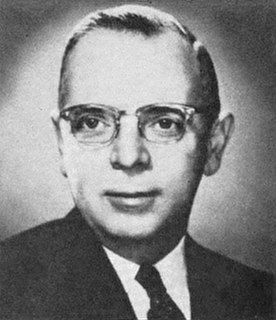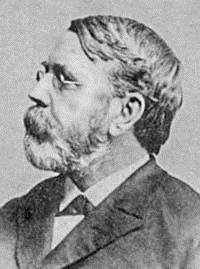
The Division of Curtin is an Australian Electoral Division in Western Australia.
This is a list of members of the Australian House of Representatives from 1966 to 1969, as elected at the 1966 federal election.

Horatio Seymour was an American politician. He served as Governor of New York from 1853 to 1854 and from 1863 to 1864. He was the Democratic Party nominee for president in the 1868 presidential election.
David William Black is a Western Australian historian. He has lectured and written extensively on Australian and Western Australian history, especially political history. He was Professor in History and Politics in the School of Social Sciences and Asian Languages at Curtin University of Technology until his retirement in 2002, and is now Professor Emeritus. He is currently Chairperson of the Parliamentary History Advisory Committee, and a Parliamentary Fellow (History).

Willard Sevier Curtin was a Republican member of the U.S. House of Representatives from Pennsylvania.

Franklin Bound was a Republican member of the Pennsylvania State Senate, who served with the 28th Pennsylvania Militia, Emergency of 1863 during the American Civil War, and was elected to represent Pennsylvania's 14th District, post-war, as a member of the U.S. House of Representatives.
Henry Dunning Moore was a Whig member of the U.S. House of Representatives from Pennsylvania.

Thomas Marshall Howe was a Whig member of the U.S. House of Representatives from Pennsylvania. He was a Financier, Statesman, Manufacturer, and Philanthropist. He was considered the leading citizen of Pittsburgh of his day.

Federal elections were held in Australia on 21 August 1943. All 74 seats in the House of Representatives and 19 of the 36 seats in the Senate were up for election. The incumbent Labor Party, led by Prime Minister John Curtin, defeated the opposition Country–UAP coalition under Arthur Fadden.

Federal elections were held in Australia on 17 November 1928. All 75 seats in the House of Representatives and 19 of the 36 seats in the Senate were up for election. The incumbent Nationalist–Country coalition, led by Prime Minister Stanley Bruce, defeated the opposition Labor Party led by James Scullin.
Leopold Copeland Parker Cowper served as (seventh) lieutenant governor of the Restored government of Virginia from November 1863 until June 1865 and then as the eighth Lieutenant Governor of the Commonwealth of Virginia from June 1865 until September 1869 under Governors John Letcher, William Smith, Francis Harrison Pierpont and Henry H. Wells.
The Curtin Labor Alliance was a minor Australian political coalition that was formed between two minor right-wing groups, the Citizens Electoral Council (CEC) and the Western Australian Municipal Employees' Union, in 2001. The name sparked outrage from the Australian Labor Party both for confusing electors and invoking former Australian Labor Prime Minister John Curtin. The Alliance claimed that Curtin was a nationalist, and that they represented the views that he would have espoused if he was alive. The Alliance was accused by Labor politicians of racism and extremist views, which were denied by the leader of the CEC, Craig Isherwood. It fielded candidates at the 2001 federal election, but achieved only mediocre results. The party was deregistered in 2005 after not contesting the 2004 election.
This is a list of the members of the Australian House of Representatives in the 16th Australian Parliament, which was elected at the 1940 election on 21 September 1940. The incumbent United Australia Party led by Prime Minister of Australia Robert Menzies with coalition partner the Country Party led by Archie Cameron narrowly defeated the opposition Australian Labor Party led by John Curtin and continued to hold power with the support of two independents. In October 1941 the two independents switched their support to Curtin, bringing him to power.
All except those in italics won the general election and were elected Governor of California.
The 1863 United States Senate election in New York was held on February 3, 1863, by the New York State Legislature to elect a U.S. Senator to represent the State of New York in the United States Senate.

The Pennsylvania gubernatorial of 1860 was held on October 9, almost one month before Presidential election. Andrew Curtin of the newly formed Republican Party won the governor's mansion over Democrat Henry Donnel Foster.
The United States Senate elections of 1862 and 1863 were elections during the American Civil War in which Republicans increased their control of the U.S. Senate. The Republican Party gained three seats, bringing their majority to 66% of the body. Also caucusing with them were Unionists and Unconditional Unionists. As many Southern states seceded in 1860 and 1861, and members left the Senate to join the Confederacy, or were expelled for supporting the rebellion, seats were declared vacant. To establish a quorum with fewer members, a lower total seat number was taken into account.
A by-election was held for the Australian House of Representatives seat of Curtin on 19 April 1969. This was triggered by the resignation of Liberal MP Sir Paul Hasluck to become Governor-General.

The Pennsylvania gubernatorial election of 1866 occurred on October 9, 1866. Incumbent governor Andrew Gregg Curtin, a Republican, was not candidate for re-election. Republican candidate John W. Geary defeated Democratic candidate Hiester Clymer to become Governor of Pennsylvania.












